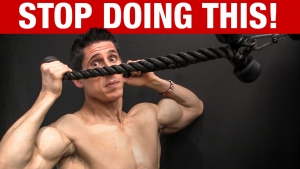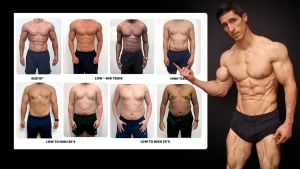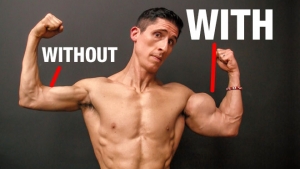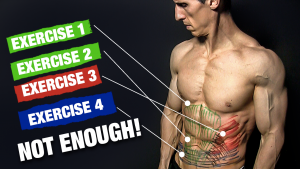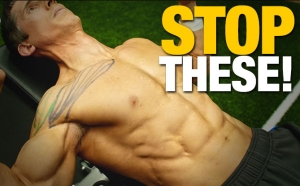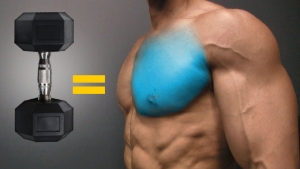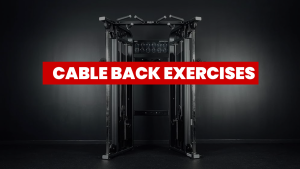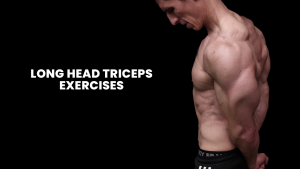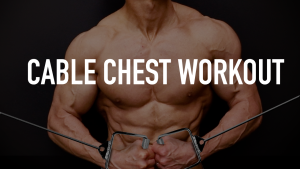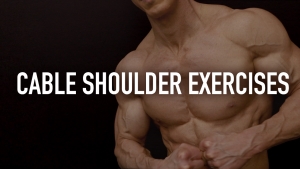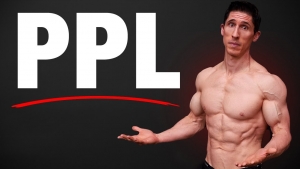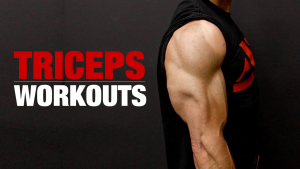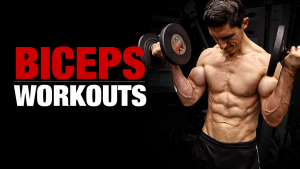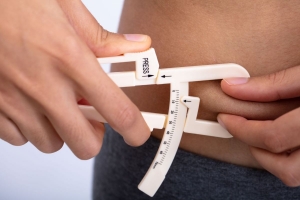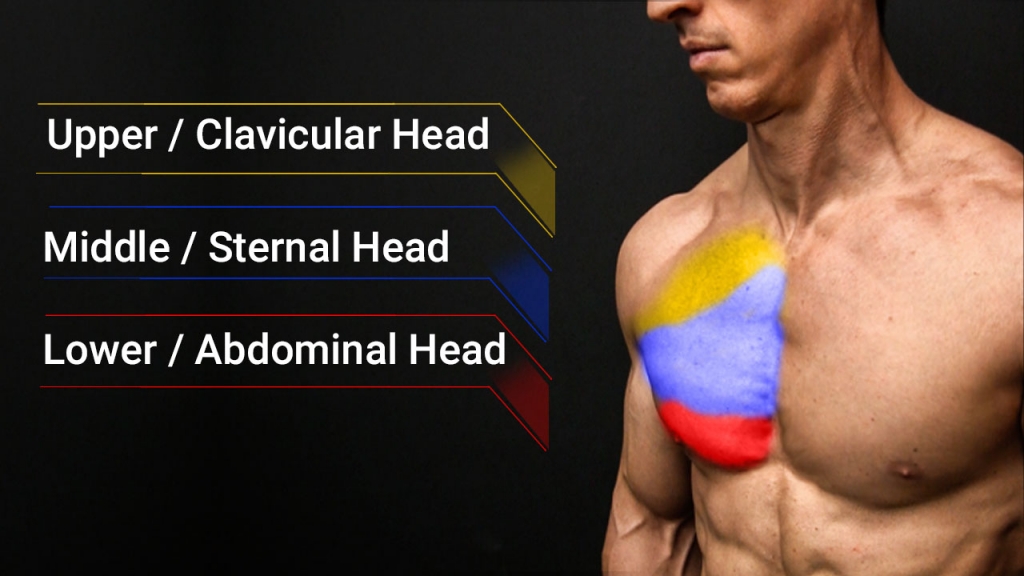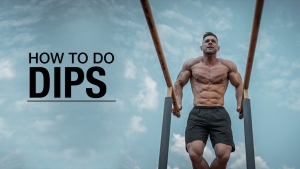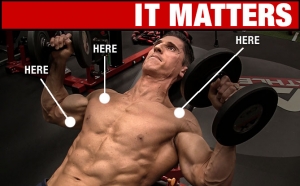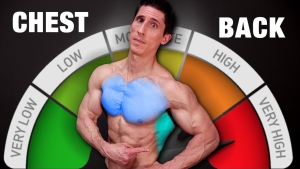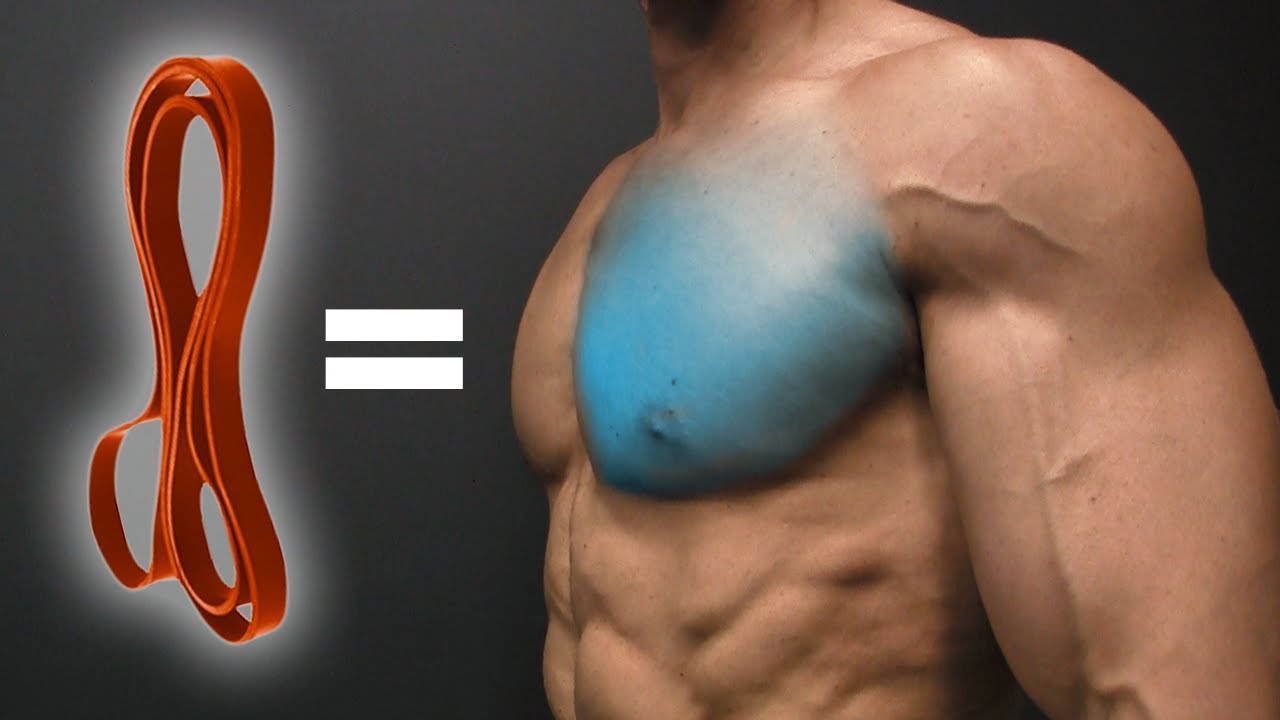
BEST RESISTANCE BAND CHEST WORKOUT
What if I told you that you could build a bigger, better chest without weights, and with workout equipment you can carry with you and use anywhere?
I think resistance bands are one of the most under-appreciated and under-utilized workout tools there is, and we all should be using them more for better muscle development and strength right now. And exercise bands are both portable and versatile. They can act as a stand-in for weighted exercises, and they can also improve performance of some bodyweight exercises.
As the number of people doing home workouts increases, knowing the best resistance band exercises is going to help you to meet your goals without compromise. And if you’re traveling with limited access to the gym, elastic bands can be your best friend!
You may think that to gain muscle mass in the chest, you have to apply heavy weight. But you’ll be surprised what you can accomplish with resistance bands.
I’ve compiled the eight best resistance band chest exercises, with movements that hit the middle, upper, and lower chest muscles.
One of the main functions of the pecs is to pull your arm toward and across the midline of your body, or adduction. Being able to train this adduction function is one of the biggest benefits of using resistance bands. For this reason, you should consider adding them to your current weight lifting routine.
Let me show you what makes resistance band training surprisingly great for building chest strength! All you’ll need to do these exercises is one or two resistance bands… maybe one lighter band and one heavier band. Below is a map of the pec muscles so you can get an idea of the key muscles we’re working on with these exercises.
8 BEST RESISTANCE BAND CHEST EXERCISES
Let’s take a look at the 8 best resistance band chest exercises one by one.
For this demonstration, I’ll be using loop bands. You could also use a tube band instead, with some modification to the movements. Loop resistance bands–like the ones I use here–allow you to “step inside” them and easily wrap them around supports, making them better suited for this resistance band chest workout.
Here are the banded chest exercises in this sample resistance band workout:
- The Saw
- Crossover Push-up
- Resistance Push-up
- Wrap-around Press
- Upper Chest Pullover
- Prone Punch-out
- Band-assisted dips
- Cavaliere Crossover
All of these chest exercises can be done with one to two sets of resistance bands.
1.) THE SAW
The Saw is a powerful band exercise that’s going to make you feel a chest contraction like never before, all with the use of just a single band.

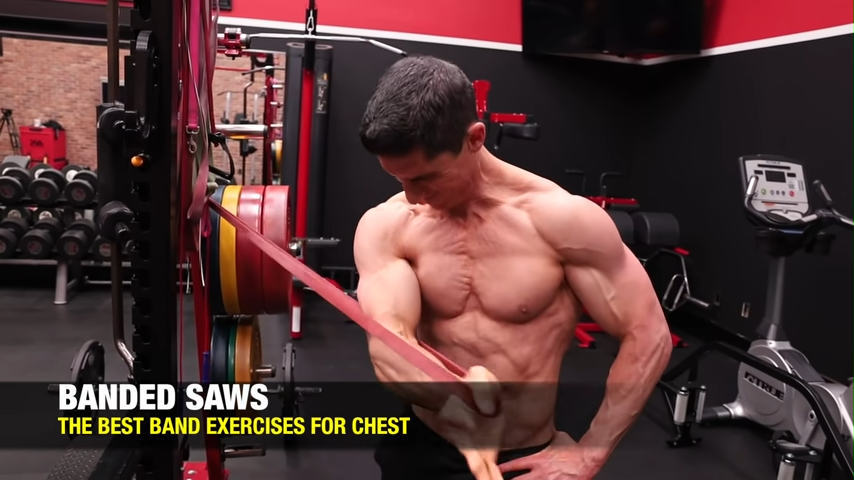
The Saw gets its name from a back and forth sawing motion across your chest. You might think of it as a resistance band crossover, but it’s not technically a crossover, because a true crossover would take your arm farther out in front of your body, inviting a lot more shoulder into the exercise.
It’s not about getting your arm away from your chest. We want to isolate the chest as much as possible and make it do the work.
Starting position is standing with feet flat on the floor next to the anchor spot for your band. Set up for the saw by anchoring a heavy band to something sturdy at about chest height, and put your hand inside the band with the elbow locked. Plant feet firmly, and using the heel of your hand, drive your arm across your chest into adduction, keeping it about chest level. The farther you drive the arm, the more you’ll pull the band taut and the more contraction you’ll feel. Maintain your core strength the entire time.
2.) CROSSOVER PUSH-UP
One of my favorite ways to get more adduction out of a standard exercise like the classic push up is to simply anchor a band to a low point and pull the band below and in front of you.

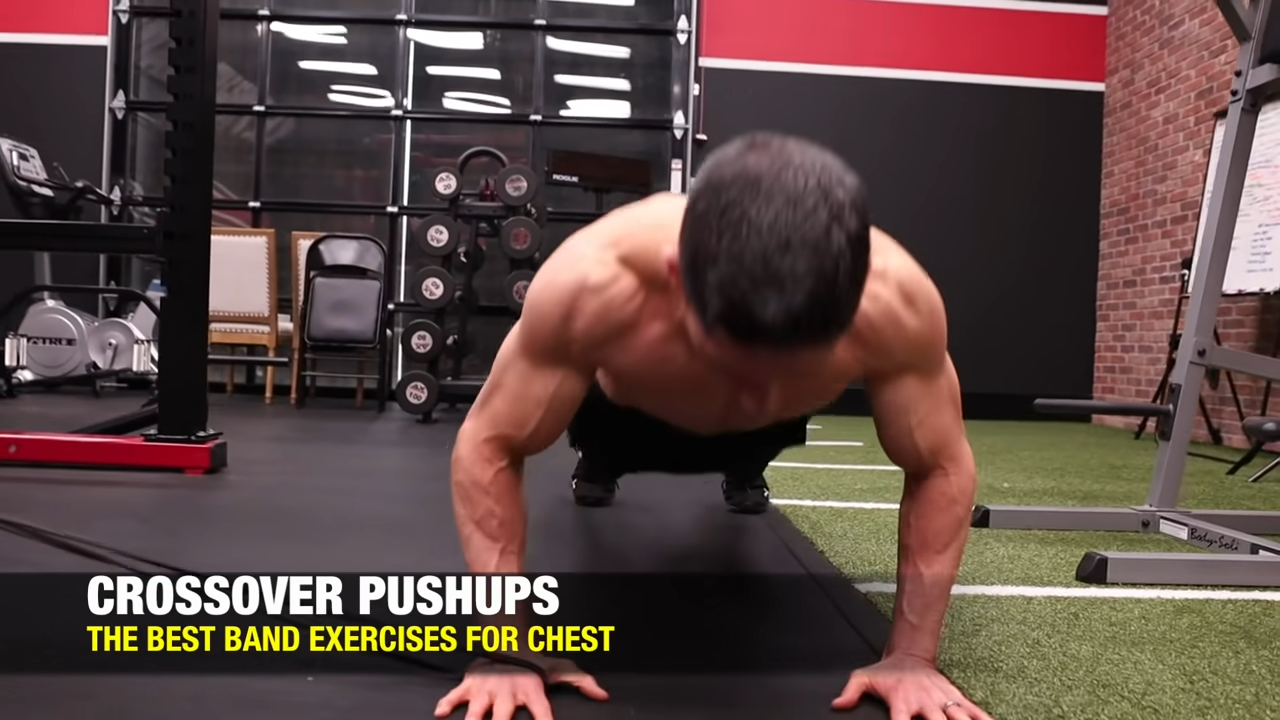
This simple resistance band version of the standard push up results in bigger dividends in your chest gains. You’ll be amazed at how challenging it is, and its surprising results. And, because you’re up on one arm for a portion of the movement, you’ll get bonus activation of your core muscles.
Starting position is in standard push up position with hands about shoulder width apart. Perform a regular push-up, but as you come to the top to high plank position, reach across your body, pulling on the band to get that resisted adduction we want, and increase the overall effect on your chest. Keep your core tight throughout this banded push-up.
3.) RESISTED PUSH-UP / BENCH PRESS
Exercise number three is just a standard push up with band resistance. It’s a frequently done band exercise for chest, but often not done as well as it could be. I like to turn it into a speed pressing exercise.
My goal is to drive up as powerfully and as quickly as possible into full elbow extension. I think you lose a lot of the benefits of the movement if you take it at a slow pace.

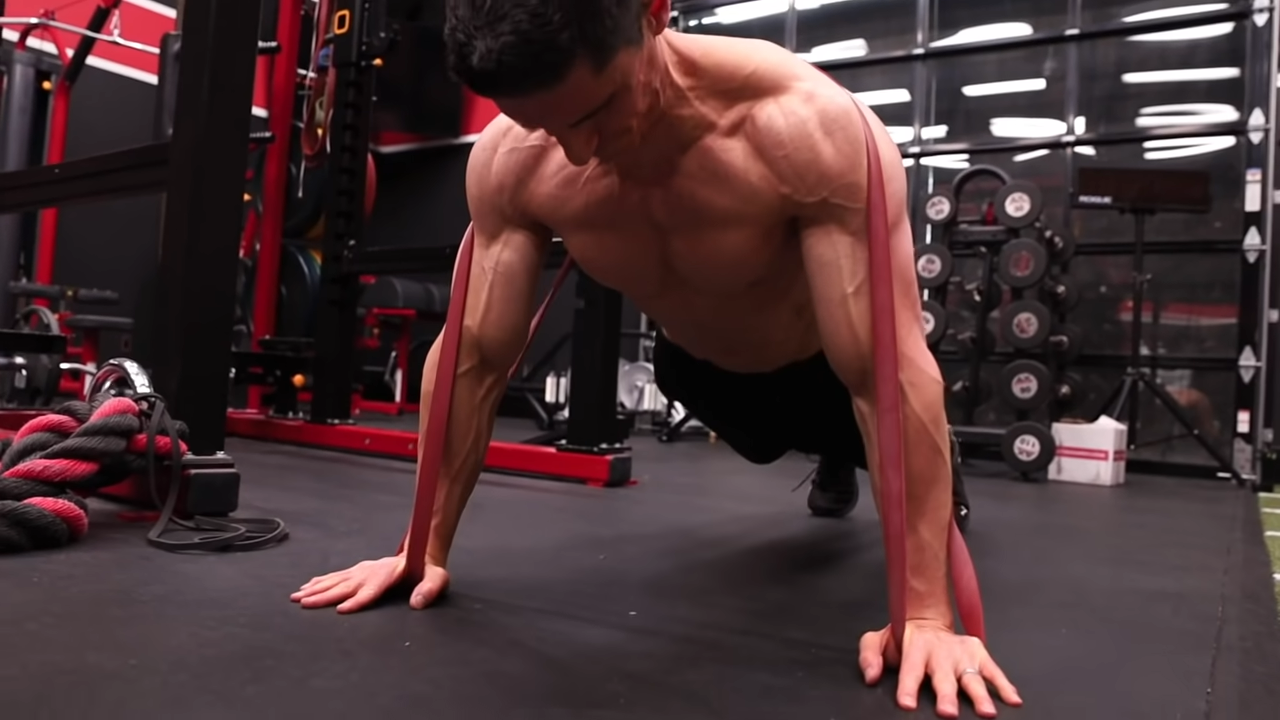
Starting position is in regular push up position with a band wrapped around your body so that you feel good band tension at the top. You’ll encounter more and more resistance as you push up. Maintain core strength the entire time.
You don’t have to restrict yourself to only floor push-ups. If you have access to a bench, you can turn these resistance band pushups into a more standard bench press feel by simply anchoring the band under the bench for a Resisted Bench Press.
To do that, pass a band underneath a bench. Holding each end of the loop, drive your hands up over your body with power and speed.

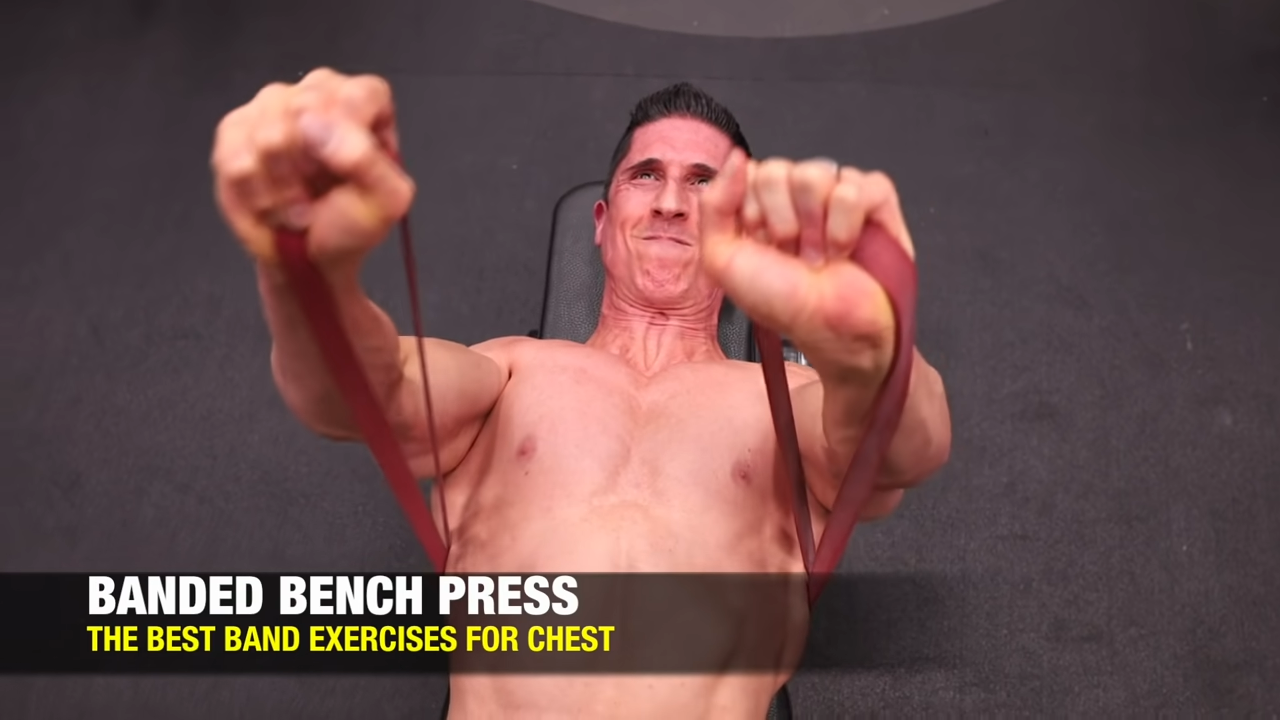
Let me emphasize: don’t make this a slow exercise. The faster you go, the faster you’ll start to see more muscle growth.
4.) THE WRAP-AROUND PRESS
If you prefer a standing version of a banded bench press or resistance band push-up, then exercise number four is tailor-made for you. We call these resistance band chest presses the Wrap-Around Press.
Starting position is standing in front of your band anchor point. Loop band to something behind you and allow your elbows to flare out a bit to the side as you press so that the band wraps around the corners of the delts, adding resistance as the hands move the arms into adduction.

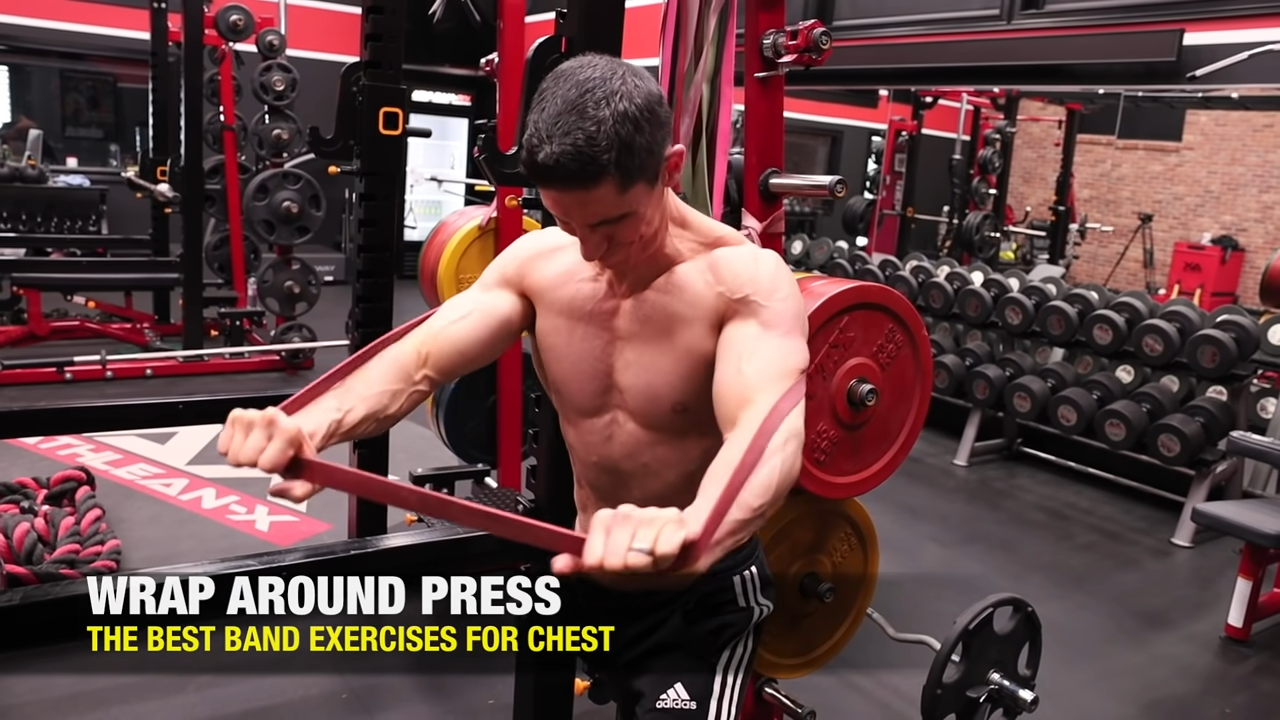
This is actually a natural pressing position for a standard bench press. If the elbows stay tucked to your sides you won’t achieve complete chest contraction.
By forcing the bands outward as they wrap around the upper arm, you get resistance as you cross your hands in front of your chest, increasing the effectiveness of the move.
5.) UPPER CHEST PULLOVER
What about the upper chest, Jeff? Funny you ask. Now we shift our focus to there with the fifth exercise, called the Upper Chest Pullover.
Using bands doesn’t mean you have to compromise upper chest development.

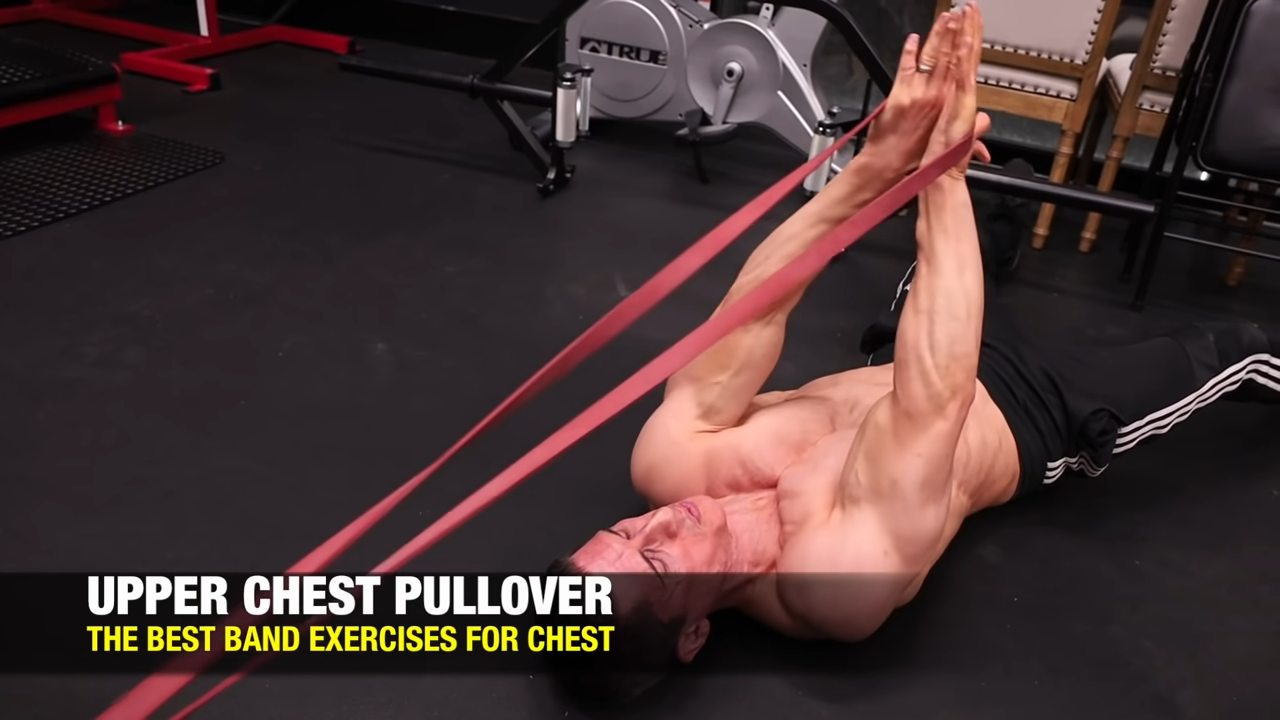
I’ve shown you before how effective it is to change a traditional lat muscles exercise into an upper chest exercise by modifying the position of your hands.
A resistance band pullover makes changing hand position easy. Even better, by hooking the bands with the backs of your hands touching each other, you create internal rotation which reduces the impingement risk found in a traditional pullover and you get better activation of the clavicular fibers.
Starting position is lying face up with your low anchor point behind your head. Loop band to the anchor point, place both hands in ensuring there is enough resistance, and initiate the band pulldown.
Guys, I promise you: this banded pullover will light up your upper chest like never before.
6.) PRONE PUNCH-OUT
We stick to upper chest in exercise number six, the Prone Punch-out, which is mechanically similar to a traditional incline dumbbell press, except on the floor.

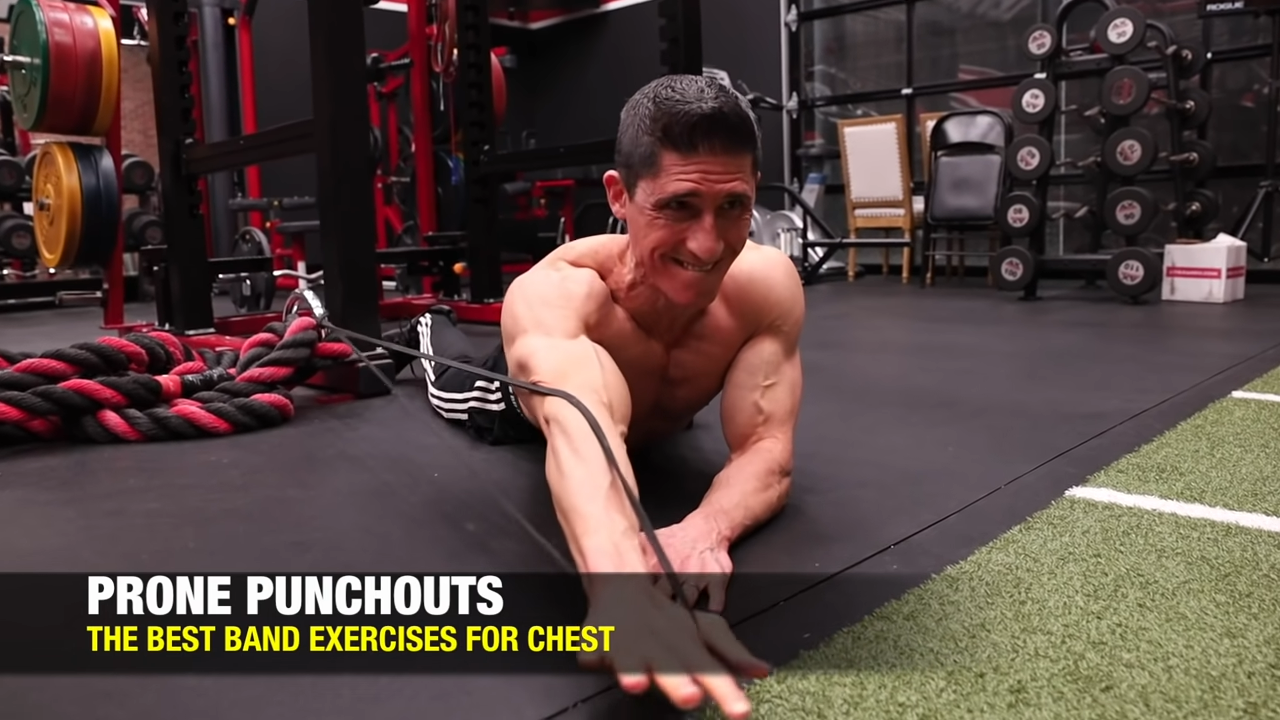
Starting position is lying face down with the anchor point to the side and behind you. Loop band around the anchor point on the side you are working.
You simulate the angle of an incline press by lying prone with the band anchored behind you. Press straight out just above the floor to full extension.
Done properly, the arm is almost dragging across the floor. Of course, it should never actually touch the ground, but keep it low to maintain the same angle of push that we would have on a traditional dumbbell or barbell incline press.
You can build a bigger upper chest by using resistance bands heavy enough to perform this amazing exercise.
7.) BAND-ASSISTED / RESISTED DIPS
We’ve shown how bands can be used for middle and upper chest. How do we hit the lower chest, the abdominal head? We know doing dips works for that, and bands can make dips a lot better.

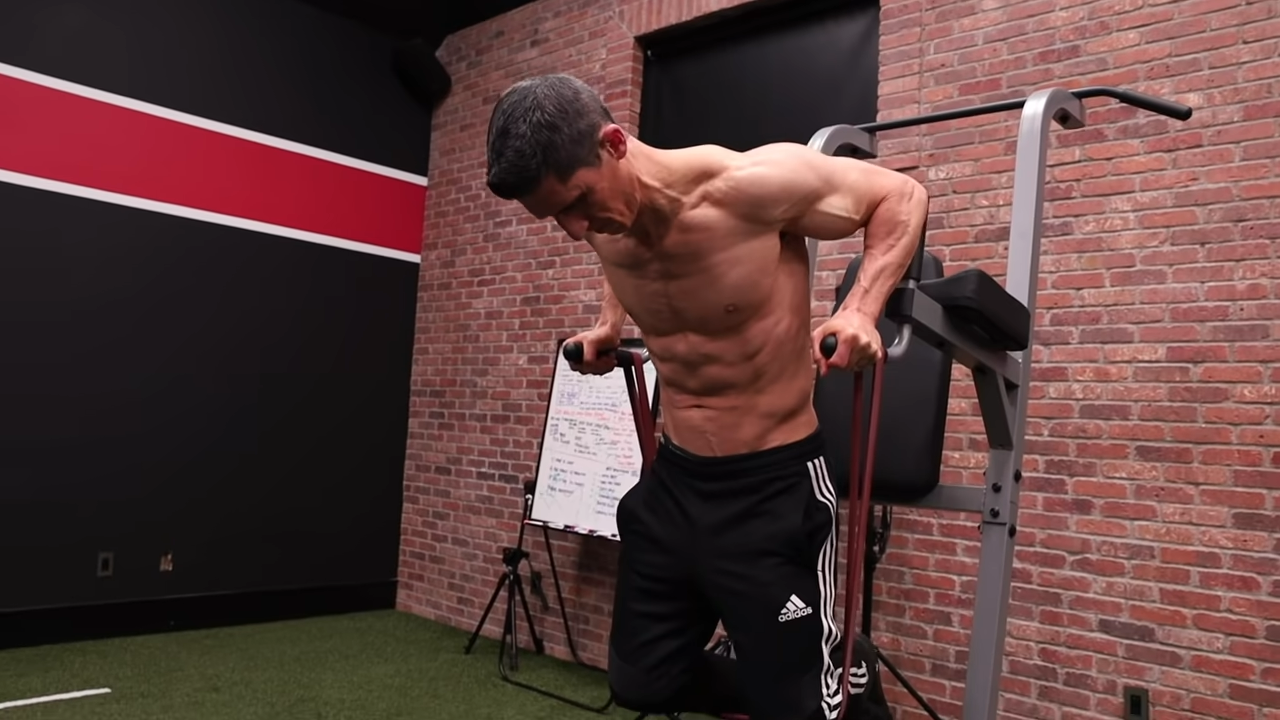
If you struggle with dips right now, you can use bands to assist. Bands can become your best friend because you can anchor them across the handles and then simply put your knees on top of them to assist you at the hardest position of the dip, the bottom.
This is an exercise where loop resistance bands are much better than a tube resistance bands.
Starting position is in the dip apparatus. Loop band around the dip bar handles and place your knees over the band. This helps you at the bottom where dips are the hardest.
Now, if you’re really looking for more of a challenge, put those bands over your back and wrap the band around wrists to perform a resisted dip. This is a brutal resistance band chest exercise.
With this variation, the bands make every rep more difficult and increase the stimulus on your chest and you’ll have the gains to show for it. Shown here is 60 pounds of extra band resistance.

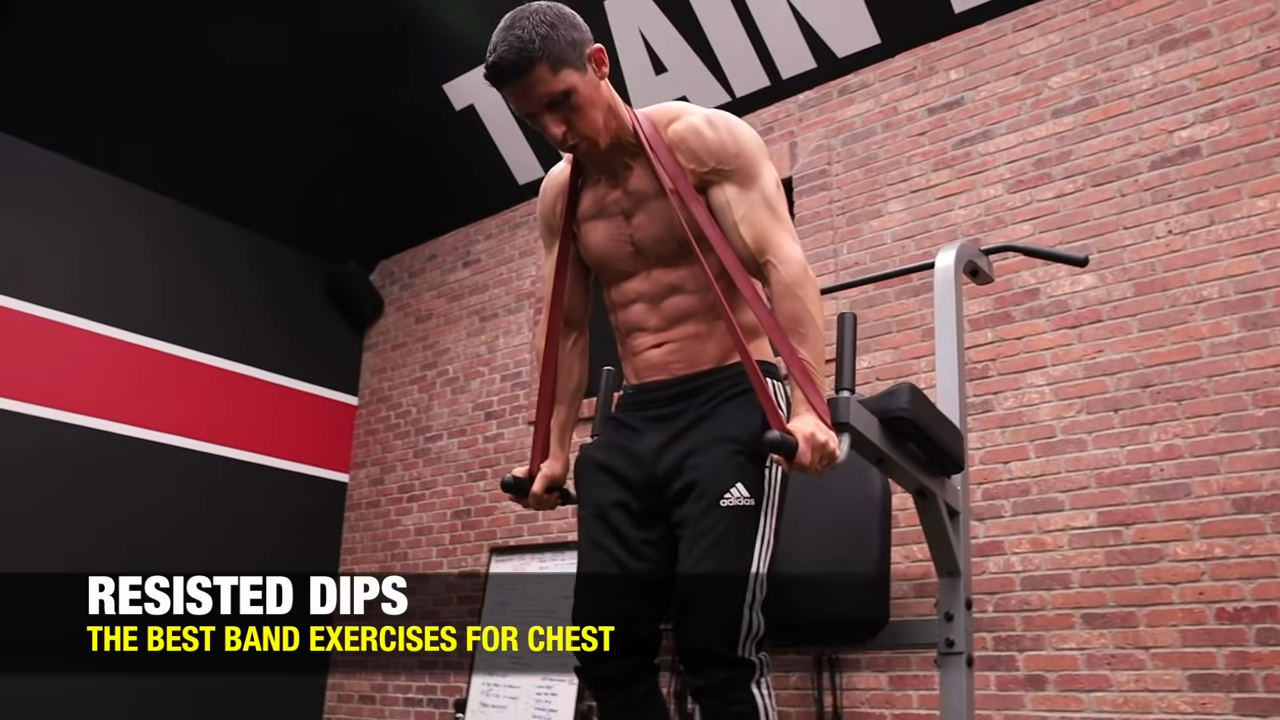
8.) THE CAVALIERE CROSSOVER
As you may have heard me say before, arm adduction is necessary to get your chest muscles as thick as they can be.
You need that full range of motion, where the arm approaches and crosses the midline of the body. The classic chest exercises–bench press, dips, and basic push-ups–don’t give us enough adduction in my opinion. The Cavaliere Crossover is a great way to incorporate more adduction by using a band.

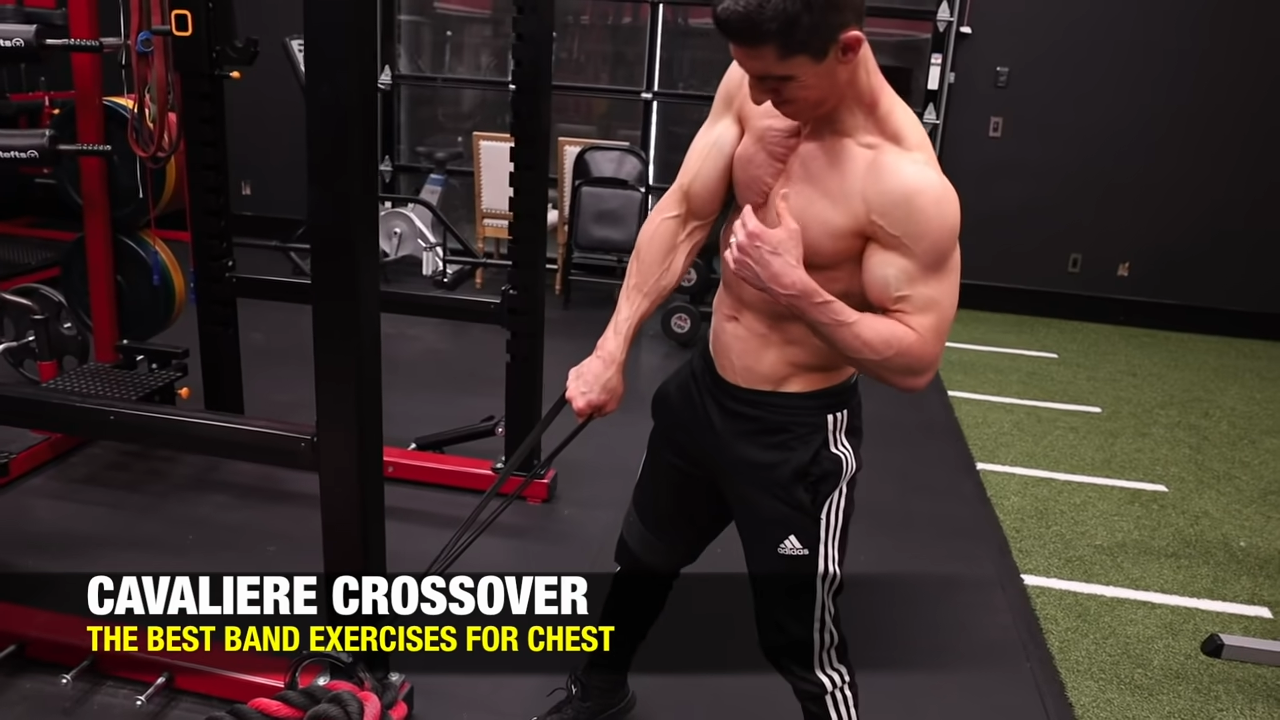
Starting position is standing with the anchor point to one side of you (the side you will be working). Loop band low and a few degrees to the side. From a starting position similar to that of a one-arm shrug, contract the pec to draw your arm up and in toward the midline.
The hand doesn’t need to come all the way across the body. The biceps simply needs to get closer to the midline of the chest, which is exactly what happens under the resistance of the band in the Cavaliere crossover.
After trying this sample resistance band chest routine, you should know how valuable bands can be for muscle growth and chest strength development.
If you’re looking for a strength training routine that shows you how to use every tool in the arsenal for muscle growth, I’ve got you covered.
See which of our ATHLEAN-X programs best fits your goals.

- Resistance band training is underrated and under-utilized. Bands can be used effectively by anyone for building strength and muscle, at home or anywhere.
- An advantage of bands over barbells and dumbbells for chest is that they allow the arms to move into greater adduction, which stimulates pec muscle growth.
- These eight exercises cover all three areas of the chest muscle: middle, upper, and lower.
- You can do this resistance band chest workout at home, office…anywhere. But remember, just because they’re portable doesn’t make them easy.
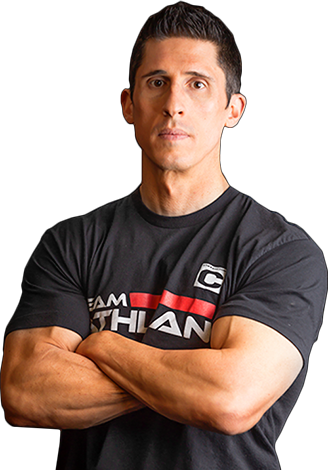
Jeff Cavaliere M.S.P.T, CSCS
Jeff Cavaliere is a Physical Therapist, Strength Coach and creator of the ATHLEAN-X Training Programs and ATHLEAN-Rx Supplements. He has a Masters in Physical Therapy (MSPT) and has worked as Head Physical Therapist for the New York Mets, as well as training many elite professional athletes in Major League Baseball, NFL, MMA and professional wrestling. His programs produce “next level” achievements in muscle size, strength and performance for professional athletes and anyone looking to build a muscular athletic physique.
